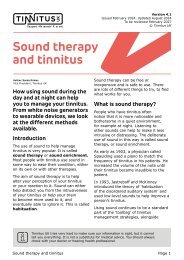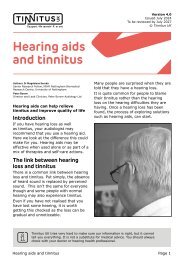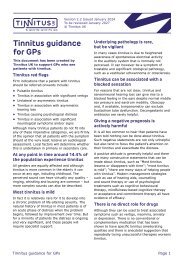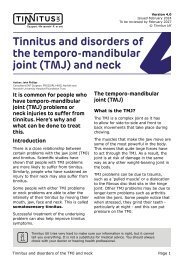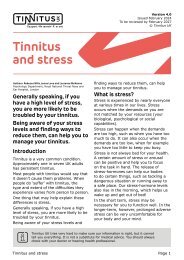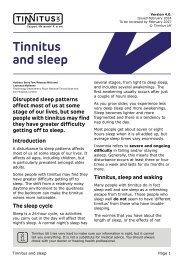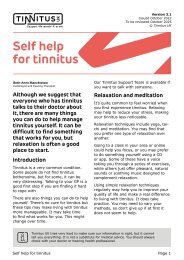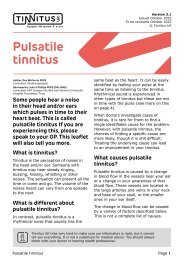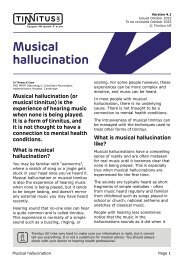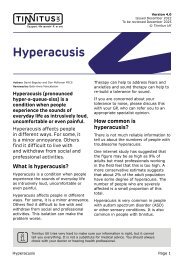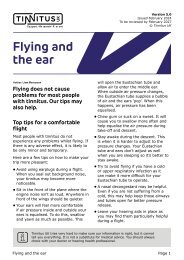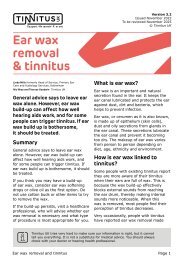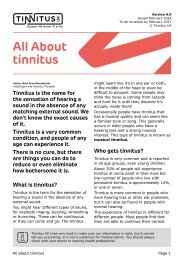Music to Your Ears report
Report looking at the impact of tinnitus on professional musicians in the UK and aiming to find out about the support they receive, or might need, to help them manage living with tinnitus.
Report looking at the impact of tinnitus on professional musicians in the UK and aiming to find out about the support they receive, or might need, to help them manage living with tinnitus.
Create successful ePaper yourself
Turn your PDF publications into a flip-book with our unique Google optimized e-Paper software.
MUSIC
TO YOUR
EARS
THE IMPACT OF TINNITUS
ON PROFESSIONAL MUSICIANS
Dr Georgina Burns-O’Connell
David Stockdale
Dr Derek Hoare
2 3
MUSIC
TO YOUR
EARS
A research study
conducted by the British
Tinnitus Association,
funded by Help Musicians
(the Musicians Benevolent
Fund) and developed in
collaboration with the
University of Nottingham.
To obtain a copy of this report:
Visit: tinnitus.org.uk/musicianswithtinnitus
Email: info@tinnitus.org.uk
Phone: 0114 250 9933
British Tinnitus Association
Unit 5 Acorn Business Park,
Woodseats Close, Sheffield S8 0TB
Registered charity number 1011145.
© British Tinnitus Association 2021. All rights reserved.
The authors:
Dr Georgina Burns-O’Connell
Research Officer, British Tinnitus Association,
Visiting Research Fellow, University of Nottingham
David Stockdale
Chief Executive, British Tinnitus Association
Dr Derek Hoare
Associate Professor, University of Nottingham
CONTENTS
The authors 2
About the British Tinnitus Association 4
Forewords 5
Executive summary 6
Acknowledgements 7
Funders and portfolio managers 7
Abbreviations and key words 7
Anne Savage’s story 8
1. Introduction 9
Research focus 9
Research questions 9
2. What is tinnitus and why is it relevant to professional musicians? 10
3. Methods 12
Eligibility criteria and recruitment 12
Questionnaire development and administration 12
Data analysis 12
Ethical considerations 12
4. Findings 13
Questionnaire results 13
Demographic information 13
Tinnitus impact 16
Findings from open-ended survey questions 17
Theme 1: Impact of tinnitus on the lives of professional musicians: “Surrounded by sound” 18
Theme 2: Services/support previously accessed by professional musicians 20
Theme 3: What support do professional musicians want? 22
5. Conclusions and recommendations 24
1. “Mental health is key”: a tinnitus support group for musicians, by musicians 24
2. Tinnitus management: support focused on relaxation techniques 25
3. An understanding and informed approach: 26
encouraging knowledge, empathy and awareness of tinnitus
4. Music education evaluation: tinnitus prevention and promoting healthy hearing 27
Research recommendations 28
Learning from this research 28
Recommendations for future research projects 28
References 29
Appendix A 30
4 5
ABOUT THE BRITISH
TINNITUS ASSOCIATION
FOREWORDS
The British Tinnitus Association (BTA) is
an independent charity that supports over one
million people living with tinnitus each year, and
advises medical professionals around the world.
We are the primary source of support
and information for people with
tinnitus in the UK, facilitating an
improved quality of life. Through our
research programme, we want to
find better ways to manage tinnitus
and, ultimately, to help find a cure.
Our vision is for a world where no one
suffers from tinnitus.
Our support services are a vital
source of emotional support and
advice to help people with managing
their tinnitus. Services include our:
Confidential Freephone
helpline, web chat, text/SMS
and email support
Online information and resources
at tinnitus.org.uk and on social
media, and in print in patient
leaflets and our membership
magazine, Quiet
Support groups online and around
the UK, and our online forum
E-learning tool,
takeontinnitus.co.uk, designed
to help people newly diagnosed
with tinnitus
Public tinnitus information
events around the UK and
online, and awareness-raising
activities, including our annual
#TinnitusWeek campaign
Up-to-date information about
local NHS services available to
patients
Developing, conducting and
contributing to a variety of
research projects
Training courses, annual conference
and information and resources for
tinnitus healthcare professionals
We commission research into finding
better treatments and, ultimately,
a cure for tinnitus; and improving
our understanding of the lived
experience of people with tinnitus.
Previous research includes work on:
Cognitive behavioural therapy
for tinnitus-related insomnia
The impact of tinnitus on military
veterans
The use of the cortisol awakening
response as a biomarker for tinnitus
Anxiety in children and young
people with tinnitus and
hyperacusis
Eye-movement desensitisation
and reprocessing as a possible
treatment for tinnitus
Mindfulness behavioural
cognitive therapy for tinnitus.
Sign up to our e-newsletters to keep up to date with our activities and research
at tinnitus.org.uk/enews or visit:
tinnitus.org.uk
British Tinnitus Association
@BritishTinnitus
@BritishTinnitus
British Tinnitus Association
BritishTinnitus
Claire Gevaux
Director of Programme,
Help Musicians
Dr Lucy Handscomb
Trustee,
British Tinnitus Association
Musicians’ hearing health is vital
to sustaining a long and healthy
career, which is why we support
musicians at any stage of their lives
with hearing health assessments
and personalised hearing protection
to protect their health. Since 2016,
our pioneering Musicians’ Hearing
Health Scheme, in partnership with
the Musicians’ Union, has provided
over 12,000 musicians access
to affordable, bespoke hearing
protection and provided a much
needed space for discussion and
education about hearing loss.
As a lifelong amateur singer, I
encounter a lot of musicians in my life
outside work. Often, when I tell them
about my job as a hearing therapist
and my involvement with the BTA,
they will tell me about concerns
related to their hearing. If they don’t
experience tinnitus themselves, they
have almost always encountered
colleagues who do, and are worried
that their ears – on which they rely
totally for their livelihood – will one
day start letting them down.
Because I know that hearing and
tinnitus are areas of huge concern
to musicians, I know that this new
BTA report will be very welcome. It
is especially welcome because it
goes beyond prevalence figures and
investigates musicians’ experiences
of tinnitus and of seeking help for
it. It highlights the fact that we
have a long way to go in terms of
providing widespread timely and
helpful information, both in terms of
preventing tinnitus and in signposting
people to appropriate help if tinnitus
starts. As a therapist, I have seen
many musicians who – with some
help – have been able to continue
In addition, through our health and
welfare services and partnership
with British Association for
Performing Arts Medicine we can
provide further support for musicians
living with tinnitus or hearing loss.
The insights and recommendations
from this report are a timely reminder
to once again raise awareness and
encourage musicians across the
country to act now to protect their
hearing for the long term and know
that there is support out there for
those who are living with the condition.
with a successful musical career in
spite of tinnitus, but there must be
many more who have had to give up
their chosen profession through fear
and lack of accurate information.
I fully support the recommendations
contained within this report. I know,
through workshops I have facilitated,
how important it is for people
experiencing tinnitus to have contact
with others with whom they can fully
identify and share ideas. I also know
how crucial it is for people to be given
clear, helpful information early on
that feels fully relevant to them. This
report – clear and easy to read – should
be widely available not just to
musicians but to those involved in
training and supporting them. I hope it
will pave the way for hearing protection
and tinnitus education to become a
routine part of musical training.
6 7
EXECUTIVE SUMMARY
AIM:
FINDINGS:
RECOMMENDATIONS:
ACKNOWLEDGEMENTS
To find out about the impact of tinnitus
on professional musicians in the UK
and to find out about the support
they receive, or might need, to help
them manage living with tinnitus.
BACKGROUND:
Tinnitus is the experience of a sound
when an external source is absent,
primarily associated with the ageing
process, hearing loss and noise
exposure. Problems reported by
tinnitus patients include an effect on
listening ability, inability to concentrate
and reduced quality of life. Amongst
populations exposed to industrial
noise, noise exposure and noiseinduced
hearing loss (NIHL) have been
found to be the factors most commonly
associated with tinnitus. Musicians
can often be exposed to high levels of
sound when practising or performing
music, meaning many musicians
may be at risk of hearing loss. The
risk of NIHL amongst professional
musicians is greater than that
amongst the general population.
METHODS:
A mixed-methods questionnaire
was designed for the study, which
included the Tinnitus Functional
Index questionnaire plus open-ended
questions. Descriptive statistics and
thematic analysis of open-ended
qualitative responses were used to
analyse the data (n=74).
Over half (51%) of the musicians
reported getting tinnitus due to ‘sudden
or prolonged exposure to loud noise/
music’. Ineffective use/lack of hearing
protection devices was reported as the
second most common reason for their
tinnitus by 22%.
Three-quarters (75%) of the musicians
reported having additional and/or
comorbid conditions alongside tinnitus.
25% of musicians reported living with a
‘mental health condition’ as a comorbidity
followed by 11% of participants reporting
hearing-related comorbid conditions.
Almost half of the musicians (45%)
said that they either ‘always’ (19%) or
‘usually’ (26%) wore hearing protection.
In contrast, almost one-quarter (23%)
of the musicians said they ‘never’ wore
hearing protection.
The qualitative, open-ended data were
categorised according to three key themes.
1. Impact of tinnitus on the lives
of professional musicians
2. Services/support previously
accessed by professional musicians
3. What support/services do
professional musicians want?
It is important to highlight that there was
natural overlap between themes due to the
varied experiences of tinnitus, and also
because of the complexities experienced
by the professional musicians in their
everyday lives.
Based on the findings, four key
recommendations were developed:
Support, Management, Understanding
and Education. Our recommendations
are for the consideration of Government,
healthcare professionals and service
providers, including any charities working
with professional musicians:
1. Support:
tinnitus support groups for musicians,
by musicians
2. Tinnitus management:
support focused on relaxation techniques
3. An understanding
and informed approach:
encouraging knowledge, empathy,
and awareness of tinnitus amongst
friends, family and those who work
with musicians
4. Music education evaluation:
tinnitus prevention and promoting
healthy hearing
Our sincere thanks are given to the
musicians who participated in this
research, without them this important
work would not have been possible.
We would also like to give special
thanks to BTA research assistants
Victoria Knowles and Oscar Cassidy
for their valued input to this project.
FUNDERS AND
PORTFOLIO MANAGERS
This project was funded by
Help Musicians (also known as
the Musicians Benevolent Fund).
ABBREVIATIONS AND
KEY WORDS
BRC
BTA
GP
HCP
HM
HHS
MHHSG
NIHL
NHS
PAC
PPI
HPD
TFI
PM
CBT
UoN
Biomedical Research
Centre
British Tinnitus Association
General practitioner
Health care professional
Help Musicians
Hearing Health Scheme
Musicians’ Hearing
Health Steering Group
Noise-induced hearing loss
National Health Service
Professional Adviser’s
Committee
Patient and Public
Involvement
Hearing protection device
Tinnitus Functional Index
Professional musician
Cognitive Behavioural
Therapy
University of Nottingham
8 9
ANNE SAVAGE’S STORY
1. INTRODUCTION
My music career began 28 years ago, 20
of which I have spent coping with tinnitus
and hearing loss caused by exposure to
loud sound, doing the job I love.
This report documents the experiences
of professional musicians with tinnitus
in the UK, and the impact that living with
tinnitus has on their lives.
The last decade has seen an increase
in my symptoms, heightened by long
periods of silence trying to study for
a degree. That’s when it first became
frighteningly noticeable. My ears used
to ring after a performance, but that
would dissipate after a few days, then
one day it just didn’t stop. The fear
that the constant ringing was now my
new silence sent me to some very
dark places. I still avoid or dread
social situations where there is any
background noise because I can’t
single out individual voices. This creates
feelings of embarrassment, isolation
and sadness because I can’t enjoy
special celebrations such as family
gatherings or weddings. Part of the
joy of being a musician is socialising
before or after a performance, but
now I leave as soon as I can to avoid
worsening my tinnitus.
I did seek medical advice: my GP
referred me to an ENT specialist for
tests, but the help offered was very
disappointing. Even though I knew
there is no cure for tinnitus before I
attended the appointment, I did
expect some practical advice.
However, I was simply asked if I was
coping and ushered out the door,
which left me feeling quite desperate.
I cut down on performances and
studio projects for fear of aggravating
the tinnitus or, worse, going completely
deaf. I considered giving up my job as
a musician completely, which left me
with an identity crisis as to who or what
I would be without my music career.
I eventually did find help by reaching
out to other sufferers and wonderful
organisations such as the BTA.
I am still surprised how, sadly,
some musicians are cautious of
discussing their tinnitus, as if ‘being
found out’ might jeopardise future
work engagements.
Currently I am happy to say that even
though I have tinnitus, I don’t ‘suffer’
from it as much, and this is due to
techniques I have learned, such as
relaxation, meditation and mindfulness.
I listen to soothing sounds of nature
whilst studying or going to sleep, which
really does help. Obviously, I wear
hearing protection and practise noise
safety, but I do still perform and
continue to write music! I passionately
campaign to raise awareness of
tinnitus and the dangers of noise in
order to try to help others to avoid
damaging their hearing.
— Anne Savage
RESEARCH FOCUS
To explore the impact of tinnitus
on professional musicians.
RESEARCH QUESTIONS
Three research questions were defined:
1. What are the expectations of professional
musicians regarding tinnitus prevention,
education and management?
2. How does tinnitus impact professional
musicians’ lives?
3. What support would professional
musicians like to have access to regarding
tinnitus prevention and management?
Image: Courtesy Anne Savage
10 11
2. WHAT IS TINNITUS AND
WHY IS IT RELEVANT TO
PROFESSIONAL MUSICIANS?
Tinnitus is the perception
of sound in the absence of
an external source, which can
be permanent or temporary
(Cima et al., 2019).
PREVALENCE AND IMPACT
It is experienced by 13% of people
(Genitsaridi et al., 2018), and for many
it can become bothersome. People
living with tinnitus report problems
including reduced quality of life,
fears, inability to concentrate, effect
on hearing ability and loss of peace
(Watts et al., 2018; Weidt et al., 2016).
PERCEPTS
Descriptions of tinnitus commonly
include experiences of hissing,
ringing or sizzling. These experiences
can be constant or intermittent and
can be perceived in one or both ears,
or localised to a source within the
head. (Baguley, 2013).
DIAGNOSIS
Tinnitus is categorised as objective,
usually resulting from a physiological
phenomenon that may be heard by
an examiner; or subjective, which
is a form of tinnitus perceptible
only to the individual. Diagnosis of
subjective tinnitus often relies on
self-reporting, with an emphasis
on the functional impact of the
condition upon the individual
(Halford and Anderson, 1991). Most
clinically administered tinnitus
questionnaires explore the presence
of other psychological conditions,
particularly anxiety and depression.
TINNITUS IN MUSICIANS
Professional musicians (PMs) perform
and practise music on a regular basis
and so are at a high risk of noiseinduced
hearing loss and tinnitus. They
are identified as a “high-risk group” who
are “in particular danger of developing
tinnitus” by the American Tinnitus
Association (2019). Musicians rely
upon their hearing for their profession,
and so may be more attentive to,
and concerned about, aspects of
hearing function (Zhao et al., 2010).
CAUSES
It is primarily associated with the
ageing process (Eggermont and
Roberts, 2004), hearing loss
(Ratnayake et al., 2009) and noise
exposure (Steinmetz et al., 2009;
Eggermont, 2012). The causes of
tinnitus are still debated, but tinnitus
is often viewed as a symptom or
comorbidity related to other conditions
such as psychological disorders
(including anxiety and depression),
as well as temporomandibular joint
disorders, and one that can be
experienced in a variety of ways.
12 13
3. METHODS
4. FINDINGS
This study used a mixed-method
questionnaire to gather information
about the lived experience of PMs
who live with tinnitus, including
demographic information and
measures of tinnitus’ impact on
professional musicians.
ELIGIBILITY CRITERIA
AND RECRUITMENT
This project used eligibility criteria
agreed with Help Musicians.
To participate in the research,
professional musicians were
required to:
Earn 50% of their income
from music
Have experienced tinnitus
Be aged over 18
Reside primarily in the UK and
be eligible to work in the UK
The research topic was promoted
online via social media and on
musician and tinnitus online forums,
with details emailed to relevant
charities and organisations.
QUESTIONNAIRE
DEVELOPMENT AND
ADMINISTRATION
The questionnaire consisted
of three eligibility questions,
demographic information and the
Tinnitus Functional Index (TFI;
Meikle et al., 2012) questionnaire
to measure tinnitus symptom
severity. Participants then answered
10 open-ended questions which
were developed specifically for
this research. These asked about
general health, the impact tinnitus
has on them, and what support/
health care they received or would
consider helpful (Appendix A). There
was patient and public involvement
throughout the research process:
the questionnaire was developed
with advice from professional
musicians and people who live with
tinnitus. It was administered online
using SurveyMonkey. All data were
anonymised by the research team.
DATA ANALYSIS
Descriptive statistical analysis
was used to gain an overview of
the findings from the close-ended
questionnaire responses. This
analysis was conducted using
Microsoft Excel software.
Analysis of TFI scores determined
which problems or domains measured
by the tool were particularly
problematic for musicians. Table 1
shows how the TFI scores were
interpreted using the classification
developed by Henry et al. (2016).
Findings from the TFI questionnaire
were cross-examined with the
qualitative results derived through
the thematic analysis (Braun and
Clarke, 2006) of the open-ended
questions in the questionnaire.
Thematic analysis was also used to
identify patterns and key themes
within the data.
Table 1: Tinnitus Functional Index score
classification according to Henry et al. (2016).
ETHICAL
CONSIDERATIONS
This study was reviewed and given
favourable opinion by the University
of Nottingham Faculty of Medicine
& Health Sciences Research
Ethics Committee (ref: 471—2001).
Participation in the study was
entirely voluntary. Completion and
subsequent return of a questionnaire
was taken as informed consent,
therefore separate written informed
consent was not required.
There was the potential that
participants could experience their
tinnitus in a more bothersome way
once they had participated in the
research and completed the survey.
The potential for negative
consequences of participation were
considered low and outweighed by
the potential positive experience of
holding an influential role in
informing future tinnitus services and
support for professional musicians.
Participants were signposted to the
resources available from the BTA and
Help Musicians.
TINNITUS IMPACT TFI SCORE INTERVENTION LEVEL
Relatively mild tinnitus <25 Little or no need for
intervention
Significant problems
with tinnitus
25-50 Possible need for
intervention
Severe tinnitus >50 Qualifies for
aggressive
intervention
This section reports the findings
from the mixed-method
questionnaire. Firstly, the results
from the demographic information
are presented, followed by the details
of the TFI questionnaire results, and
finally the findings from the openended
questions are reported.
QUESTIONNAIRE
RESULTS
Demographic information
The questionnaire was completed by
74 eligible participants: of those who
reported their gender, 70% (n=51)
identified as ‘male’ and 30% (n=22) as
‘female’ (one non-response). Age was
reported in six categories with 27%
(n=20) of musicians reporting being
40-49 years old making this the most
common age group. This was followed
by the age groups 30-39 years and
50-59 years with 24% (n=18) and 19%
(n=14) respectively. Only one
participant was aged 18-19 years,
whilst 10 were aged 20-29 years and
nine were aged 60 years or older; two
respondents did not report their age.
Figure 1: Percentage of participants in different age categories
AGE OF PROFESSIONAL MUSICIANS
1%
18–19
14%
24%
27%
19%
12%
20–29 30–39 40–49 50–59 60+ N/A or
didn’t say
3%
Sixty-six participants (89%)
identified their ethnicity as white UK,
two from a different white background,
one musician was white and Asian,
one Asian/British, and one identified
as ‘Eurasian’. Three participants did
not report their ethnicity.
Participants also reported their
sexual orientation, with 72% (n=53)
identifying as heterosexual/straight,
7% (n=5) as bisexual, 4% (n= 3) of the
participants as gay woman/lesbian
and one participant as ‘gay man’. 12%
of participants selected ‘prefer not to
say’ (n= 9), and for the participants
who selected to ‘self-describe’ (5%;
n=3) the most common response
was ‘queer’. Of those who answered
the question, 18% (n=12) identified as
lesbian, gay, bisexual or queer.
The musicians were also asked if
they had experience of any additional
health conditions or illnesses. In
addition to experiencing tinnitus, the
majority of participants had
experienced and/or been diagnosed
with other health conditions. These
included mental health conditions
such as anxiety or depression, and
other additional hearing conditions.
Of the responses to this question,
three-quarters reported having
additional and/or comorbid conditions
alongside living with tinnitus. The most
commonly reported comorbidity was
‘mental health’, with one-quarter
(n=21) of the responses. 11% (n=9) of
the participants reported hearingrelated
comorbid conditions.
14 15
Figure 2: Number of participants diagnosed with another illness/condition
Figure 4: Number of participants and reasons for getting tinnitus
WHAT CONDITIONS/ILLNESSES
HAVE YOU BEEN DIAGNOSED WITH?
HOW DO PARTICIPANTS THINK THEY GOT TINNITUS?
34
21
16
21
9
Mental health
condition
4
Cancer
7 6
Hearingrelated
Cardiovascularrelated
Muscle/joint
affliction
Other
None
Loud noise /
music exposure
12
Pre-existing
hearing issues
7
Stress
15
Lack of /
ineffective HPDs
10
Specific
instrument use
3
Other
6
Unsure /
Don’t know
Figure 3: Percentages of participants with tinnitus of different durations
HOW LONG HAVE YOU HAD TINNITUS?
9%
1 year or less
2–5 years
15%
6–10 years
11–20 years
21–30 years
13%
30+ years
3%
18%
42%
Participants also answered questions
specific to their profession, reporting
the type of musician they were in
seven categories. The largest category
was ‘group member’, with 34% (n=25)
of participants selecting this
response, followed by ‘other’ (n=11),
‘multidisciplinary artist’ (n=9), ‘solo
artist’ (n=9), ‘artist/producer’ (n= 7),
‘composer’ (n=6) and ‘songwriter’
(=6). One participant did not respond
to this question.
Participants reported on how often
they wore HPDs while at work.
Almost one in five participants (19%)
said they ‘always’ used HPDs, and
26% (n=19) stated they ‘usually’ wore
HPDs. However, almost one-quarter
(23%) of the musicians said they
‘never’ wore HPDs (n=17)
Figure 5: Percentage of participants within each specific type of profession
WHAT TYPE OF MUSICIAN ARE YOU?
The sample included participants
who had lived with tinnitus for a
broad range of timescales: 1 year
or less (= 13); 2-5 years (= 31); 6-10
years (= 10); 11-20 years (= 11); 21-30
years (= 7); and over 30 years (= 2).
Sixty-seven participants reported
how they thought they got tinnitus.
These responses were grouped into
six categories which highlighted
that over half (51%, n=34) of the
musicians reported getting tinnitus
due to ‘sudden or prolonged
exposure to loud noise/music’.
Ineffective use/lack of hearing
protection devices (HPDs) was
reported as a reason for their
tinnitus by 22% (n=15), pre-existing
conditions or hearing issues by 18%
(n=12), personal use of specific
instruments or their proximity to
others by 15% (n=10), stress was
reported by 10% (n=7), and other
causes such as family history were
reported by 4% (n=3) of participants.
9% (n=6) were unsure of what may
have caused their tinnitus.
Solo artist
Artist / producer
Composer
Group member
Multidisciplinary artist
Songwriter
Other
8%
12%
15%
34%
13%
10%
8%
16 17
Figure 6: How often participants wear HPDs at work (as percentages)
HOW OFTEN DO YOU WEAR HEARING PROTECTION?
Always
Usually
Sometimes
Rarely
Never
TINNITUS IMPACT
The severity of tinnitus symptoms
differed across the range of potential
scores (0-99), with the average total
TFI score of 39.05 (SD = 22.12) being
interpreted as ‘significant problems
with tinnitus’ with a ‘possible need
for intervention’ (Henry et al., 2016).
Table 2 shows the average
participant scores on each subscale,
corresponding to specific tinnitus
problems, of the TFI in order of most
13%
23%
19%
19%
26%
‘severe’. The three highest scoring
subscales for professional musicians
based in the UK were ‘relaxation’,
‘sense of control’, and ‘intrusiveness’.
‘Relaxation’ was the only domain
which was scored as ‘severe’ while
all other scores indicated a
‘significant problem’ with a ‘possible
need for intervention’ (Henry et al.,
2016). The domain the participants
scored lowest was ’quality of life’,
which was scored as ‘relatively mild
tinnitus’ (Henry et al., 2016).
Table 2: Tinnitus Functional Index (TFI) mean total score and mean subscale scores
MEAN/100
TFI TOTAL SCORE 39.05 22.12
TFI SUBSCALES
Relaxation 50.86 31.83
Sense of Control 47.66 25.25
Intrusiveness 42.84 23.73
Auditory 40.45 29.75
Sleep 35.59 31.16
Cognitive 34.59 26.29
Emotional 34.01 27.33
Quality of Life 29.59 25.56
SD
The TFI questionnaire scores show
that overall the musicians’ tinnitus
caused significant problems with
possible need for intervention.
Tinnitus had a severe impact on
relaxation, which means it would
qualify for aggressive intervention
within this domain. None of the
average scores for the musicians
were classified as having a ‘relatively
mild’ impact, indicating there is a
‘significant problem’ for musicians
who are living with tinnitus.
When compared with a general
research population, the PM
population scored lower than the
general research population, apart
from the ‘auditory’, ‘emotional’ and
‘quality of life’ domains (see Table
3). These findings are at odds with
findings from the qualitative parts
of the research which indicate
tinnitus could be a severe problem
for UK professional musicians who
participated in this research. There
are many reasons why the TFI scores
may differ to the data reported in
the open-ended questions in the
survey. Anecdotally, this difference
could be due to stigma around
hearing health in the musician
profession and PMs not wanting to
be categorised as having ‘hearing
problems’ given that their hearing
is arguably the most essential part
of their work. Another reason could
be that the TFI questionnaire is not
relevant to musicians’ lives. Fackrell
(2016) stated, “TFI scores may be
poorly responsive to change in a
research population,” therefore some
amendments to the TFI or a new
tinnitus questionnaire developed
specifically for measuring the impact
of tinnitus on musicians could be
beneficial in future work.
Table 3: Tinnitus Functional Index (TFI) mean total scores and mean subscale
scores of UK professional musicians and a UK research volunteer population
TFI Domain
TFI Scores (mean average)
UK PMs a
General Research
Population b
Total TFI score (0-99) 39 41
Intrusiveness 43 53
Sense of Control 48 54
Auditory 40 34
Relaxation 51 55
Cognitive 35 36
Emotional 34 30
Quality of Life 30 28
Sleep 36 50
a. Present study; sample size n=74.
b. Fackrell et al., 2016; general UK research volunteer population sample size n=283.
FINDINGS FROM
OPEN-ENDED SURVEY
QUESTIONS
The qualitative data collected
during this study were categorised
according to three key themes
(Table 4), and within these themes
there were also clear subthemes.
It is important to highlight that
there was natural overlap between
themes, due to the complexities
experienced by the professional
musicians in their everyday lives.
Table 4: Qualitative themes
Qualitative Themes:
1. Impact of tinnitus on the lives
of professional musicians
2. Services/support
previously accessed by
professional musicians
3. What support/services do
professional musicians want?
18 19
THEME 1: IMPACT OF TINNITUS ON THE LIVES OF
PROFESSIONAL MUSICIANS: “SURROUNDED BY SOUND”
Within the theme ‘Impact of tinnitus
on the lives of professional musicians’
were two subthemes: ‘Impact of
tinnitus on professional life’ and
‘Impact of tinnitus on personal life’.
Each of the participants experienced
their tinnitus in distinct ways, and
different aspects of their lives were
affected by it; the impact tinnitus
has on their work is particularly
relevant, given the link between the
nature of their job and tinnitus itself.
IMPACT OF TINNITUS
ON PROFESSIONAL LIFE
Several musicians described how
tinnitus affects their concentration
and frustrates them when they rely
on their hearing to produce music:
PM2: It does get annoying and can have
an impact on concentration during solo
practice. It can also be incredibly
frustrating in quieter moments of the
music, in orchestra or chamber music
for example, to start hearing tinnitus.
PM66: Especially in a job with such
reliance on listening. My general
hearing loss is definitely also making
my job more difficult.
Many also discussed how tinnitus
restricted their ability to do their job,
and influenced the quality of the work
they produced, as they struggled to
navigate the varying sound inputs:
PM63: hard to concentrate and also
to notice nuances in a production.
PM15: I feel I can’t properly mix track[s]
and I miss certain information that
could impact the quality of my music.
PM42: I am sometimes unsure if I am
hearing a high-pitched note from
somewhere, or if it is in my head. This
can affect my perception of harmony.
Tinnitus can also affect the jobs that
musicians feel comfortable doing
and how they feel whilst doing their
work. One participant had refused
to work at certain events depending
on the noise exposure at the venue,
while another shared how tinnitus
could impact on their mood and, as a
result, they struggled to feel positive
about their work:
PM22: Turned down certain gigs if
too noisy.
PM58: After a certain [a]mount of time
each day it starts to bother me and
affect my enjoyment in writing music.
Some participants also described how
being a member of the music industry
can interact with their tinnitus and
hearing experiences. One participant
highlighted their regret and how
difficult tinnitus is to manage for
professional musicians given what a
high priority music is in their lives:
PM11: Wish I’d taken more care but
so easy to get carried away in the
music [which is really my life].
In contrast to the negative impact
experienced by musicians, a small
number of musicians reported that
their profession could be beneficial
in managing their tinnitus:
PM2: Fortunately being a musician and
being surrounded by sound means
that I often don’t notice my tinnitus.
PM72: Normally it has no impact
as I find playing music masks the
tinnitus. It’s when I stop is when it
starts to impact my life.
IMPACT OF TINNITUS
ON PERSONAL LIFE
For many participants, tinnitus
hindered their social life and led to
avoidance of certain events or settings,
which in turn led to feelings of
isolation. One participant specified
that their tinnitus was often worsened
due to the levels of stress they
experienced in social situations. As
a result, their tinnitus could frequently
dictate how they navigated social
activities and events:
PM59: [I] tend to assess events in
terms of noise and [how] they might
affect my tinnitus. I am now more
cautious in engagements I take on
and the level of stress they might
generate – thus affecting my tinnitus.
For many individuals, tinnitus often
acted as a barrier to maintaining
conversations with others, disrupting
their social interactions:
PM50: I speak too loud. I can’t hear
what people are saying – when they
tell me their name for instance. I
cannot cope at all with having lots
of people in a room all talking at
the same time - networking events,
parties, etc.
PM24: I get frustrated easily because
I find it hard to follow conversation.
PM61: It [tinnitus] can exclude you
from conversations.
In addition, several participants
described their struggle with finding
peace and quiet, as well as feelings
of loneliness:
PM54: I am in mourning for the loss
of personal peace and quiet.
PM56: A lonely place to be in [yo]ur
head when no one can hear it but you.
PM72: At times the tinnitus can
make you feel very isolated, alone
and extremely drained.
Also apparent from the statistical
findings are difficulties faced by
participants with relaxation, as
indicated in the TFI scores. This is
reflected in the open-ended question
data, as individuals described problems
with being able to relax and/or sleep:
PM28: I never experience absolute
silence, which make it difficult to
relax, and/or sleep.
PM4: Struggle with watching tv,
relaxing, sleeping.
PM2: It [tinnitus] impacts my ability
to wind down and relax.
Many discussed how having tinnitus
could “isolate” them from others
who have no understanding of
tinnitus. One participant described
their head as “a lonely place” as
only they can hear their tinnitus,
which is especially relevant, since
tinnitus is often regarded as an
invisible symptom or condition.
Some participants also outlined
the general scope of negativity
attached to tinnitus, wanting more
understanding and awareness from
those who do not have it:
PM27: Just need understanding
that I really do need to leave/change
seats etc.
PM68: Some awareness would help
with stigma.
A number of responses further
described how tinnitus negatively
impacts mental health and
emotional wellbeing:
PM6: I have to hide my anxiety and
desperation all the time and I have
to continue to perform.
PM2: The inability to experience
complete silence can be quite
depressing.
PM8: Anxiety affects relationship
with family.
PM54: [tinnitus] has been cause of
depression in the past.
As outlined in the statistical data,
participants struggled with mental
health issues which were closely
related to their tinnitus. Amongst this
sample of musicians, this was
predominantly portrayed as
manifesting in feelings of anxiety
and depression. One participant
disclosed that their tinnitus makes
them feel “drained physically,” as
well as mentally (PM72).
These data show the impact that
tinnitus can have on musicians’
professional and personal lives.
When talking about the impact it had
on their profession, the participants
highlighted the negative impact
tinnitus had on their ability to work
due to their listening skills being key
to their career. During work, tinnitus
impacted on their concentration,
trust in their hearing and listening
ability and their enjoyment of working
as a musician. Whilst participants
mostly highlighted the negatives of
living with tinnitus as a musician,
some participants recognised
that being a musician could have
a positive impact on managing
their tinnitus; being “surrounded
by sound” during their work offered
other sound as a distraction from
their experience of hearing tinnitus.
Being “surrounded by sound” during
their personal time however, resulted
in many of the participants finding
it difficult to achieve ‘peace and
quiet’. In turn, this acted as a barrier
to the participants being able to
relax and was seen as a contributing
factor in difficulties some musicians
faced with sleeping. The negative
impact the experience had on the
musicians’ mental health and
emotional wellbeing was reported
by the participants, with anxiety,
depression and the impact on
relationships being highlighted.
Another challenge of living with
tinnitus which was identified by
the participants was difficulties in
attending social events, particularly
when there were many people talking
in one room: this led to a reduction
in attendance and involvement in
events and conversations, with
some participants withdrawing from
socialising completely based on
the noise levels and the perceived
consequence of these on their
experience of tinnitus. Consequently,
for some of the musicians, their
experiences of living with tinnitus had
culminated in feelings of loneliness
and social isolation.
20 21
THEME 2: SERVICES/SUPPORT PREVIOUSLY
ACCESSED BY PROFESSIONAL MUSICIANS
Participants described the support or
information they had already received
from various sources within different
stages of their career. This theme
contains three subthemes, which are,
‘Support/awareness in education and
employment’, ‘Healthcare/treatment
accessed’ and ‘Support from family
and friends’.
SUPPORT/AWARENESS
IN EDUCATION AND
EMPLOYMENT
Participants described the support or
information they received whilst in
education, as well as their experiences
in the workplace. Many discussed how
this advice was frequently too vague,
and more of a general warning that
was not very useful in educating or
protecting their hearing health:
PM64: Just told to be careful.
There wasn’t much in the way of
actual education.
PM28: No specific remedies or
coping strategies were taught in
formal education.
PM8: Non[e] of the commercial venues
I have worked in have ever offered
hearing protection as part of PPE.
One participant shared that they had
received a lecture from a Musician’s
Union representative surrounding
tinnitus/hearing health, but the
presentation failed to engage them:
PM8: Musicians Union rep came
to lecture at BTEC course. Very
boring presentation which switched
everyone off the topic. If lecture had
been delivered in a slightly engaging
way may have paid more attention.
Whilst it was encouraging that some
education institutions had provided
information about tinnitus and hearing
health, the participant explained that
the way it was communicated was
imperative to the information being
acknowledged and any behavioural
advice being adopted.
Some individuals also stated that they
had received advice which was more
effective from specific organisations
or within a certain environment:
PM35: At [name of music college] we
were told about the causes, advised
about hearing tests.
PM51: In a [name of place] they did
regular ear tests.
PM28: I have worn earplugs since I
started as a professional (at 15, I’m
now 30), due to a drum tutor with
chronic tinnitus and other older
musicians with hearing loss, who
warned of the dangers.
Many participants received support
specific to HPDs at their place of work
and in education, including guidance
about use and where to obtain them:
PM4: Also, our employer provided
decent earplugs free of charge.
PM60: Lectures were given at the
beginning of each academic year
during postgraduate study on
tinnitus and ear protection.
Amongst the responses were
descriptions of experiences specific
to tinnitus management, including
advice from others as well as
personal management techniques:
PM6: Some guidelines about CBT.
PM56: Just about coping strategies.
PM22: I use moulded ear plugs and
foam plugs for very loud gigs.
PM28: I developed my own
management ideas (white noise,
podcasts) to help me sleep.
ACCESSING HEALTHCARE
A common finding was the professional
musicians’ unsatisfactory experiences
with NHS healthcare they had
previously accessed. Many individuals
received basic healthcare support
limited to an initial diagnosis or GP
appointments which included
“assessments, information, referrals”
(PM59) and “hearing tests” (PMs 22, 35,
46, 69). Some individuals expressed
their disappointment with this level of
support from healthcare professionals
(HCPs), finding it inadequate. Many
also described their experience as
negative in tone and unhelpful due to
the conduct of HCPs and the dismissive
assumption that there was “nothing
they could do” for the tinnitus:
PM2: Have been to the GP a couple
of times but told there’s not much
they can do.
PM22: ENT. 10 years ago he was
useless. no empathy. no useful advice.
PM69: I was essentially told there
was nothing they could do and that
was that.
In contrast to this more general support,
some participants also accessed
support in a professional capacity from
organisations or individuals with a
specialist knowledge of tinnitus. This
included HCPs specialising in tinnitus
or hearing health, as well as the BTA
support groups or helpline:
PM46: A few calls to BTA helpline for
advice/support.
PM58: I have seen an audiologist
once a year for roughly 5 years and
have visited tinnitus support groups
in the past.
PM59: Consultants ENT, Audiologists:
testing, information and advice. MRI
scans BTA Tinnitus Support Group
BTA Tinnitus Information Day 2020.
The mental health conditions
associated with tinnitus, briefly
alluded to amongst the statistical
findings, were also highlighted by
individuals who reported accessing
different means of psychological
support. Although some participants
discussed their unhelpful experiences
with healthcare or tinnitus treatment,
one participant discussed how “useful”
their CBT had been:
PM23: He suggested that I looked
into Mindfulness Meditation and he
referred me to the local mental health
department. I had weekly Cognitive
Behavioural Therapy sessions with a
young therapist who had previously
treated patients with tinnitus. It was
a slow process but it was the start
of my recovery. Mindfulness became
more useful as I progressed (even
though I’m really rubbish at it!).
This participant acknowledged the
benefit of CBT and mindfulness-based
therapy to help them live well with their
tinnitus. Furthermore, they identified
the different steps taken in the process
of learning to manage their tinnitus.
Some participants received support
specific to the management of their
tinnitus, predominantly resources such
as hearing aids and hearing protection:
PM27: Hearing aids for the last 4
years – helps a lot if they’re tuned to
match the tinnitus.
PM71: I have hearing protection via
Help Musicians.
One participant described how they
followed professional advice to use
HPDs but expressed sadness that
no medical “treatment” was offered.
This suggests a desire for a ‘cure’ for
their tinnitus:
PM61: I was told there was nothing
that could be done, other than
recommending the app. And of course
they recommended ear protection, so
at that stage I purchased moulded ear
plugs for different decibel levels from
said hospital. The service was great, it
was just sad there was no ‘treatment’.
SUPPORT FROM
FAMILY/FRIENDS
A large number of participants
discussed how useful their social
support networks were for helping
them in coping with their tinnitus.
Many mentioned how talking about
the tinnitus with family members
was helpful in lifting their mood and
dealing with feelings of stress:
PM58: Yes my wife is very
supportive and will always talk
about it if I need to. She gets quite
upset about me having tinnitus but
always wants to do whatever she can
to make me feel better. My mother is
also very supportive.
PM64: My partner is very good at
talking me down from stress and
anxiety. I find it helpful just to be
able to take your mind of[f] things.
Otherwise you become transfixed on
one thought pattern.
One participant also stated that their
family were “sympathetic” and “starting
to understand” how tinnitus can affect
their mood. Many others also described
how their families provided support
by accommodating their tinnitus,
including the impact it can have in
their social and everyday lives:
PM59: Yes. My partner is very
supportive. She has done her
reading and attends the tinnitus
support group with me. She also
came with me to the 2020 Tinnitus
Information day in Birmingham.
When I am very quiet she asks how
the tinnitus is and always considers
the possible impact of any social
events on my tinnitus – concerts,
cinema etc. This support is invaluable.
PM60: Yes – my family and friends
understand it can be frustrating for
me to ask them to repeat themselves!
They also know to give me space or
play white noise to help me cope.
Several individuals described
how this sort of understanding
and empathy was beneficial to
them when they received it from
others who have also experienced
tinnitus. They discussed how it was
“very reassuring” to share similar
experiences with fellow musicians
who have managed to limit the
impact tinnitus had on their career
and “still work in music”:
PM8: Other local musicians/artists
with tin[n]itus. Facebook groups.
Hearing other people stories and
realising there are many other
people going through the same
thing was very reassuring.
PM59: From the tinnitus support
group hearing about other experiences
does help even though it is usually
difficult [to] apply their approaches.
Know[ing] there are others with
similar problems always helps – the
group support and empathy etc.
PM46: Finding out about others who
suffer and still work in music.
22 23
THEME 3: WHAT SUPPORT DO
PROFESSIONAL MUSICIANS WANT?
The majority of participants explicitly
discussed the tinnitus support or
services they wanted access to in
the future. This largely addressed
improvements that should be made
to the means of support already
available, which has been accessed
previously by PMs to varying extents
with mixed results as reported in the
previous section of this report. Within
this third theme are two subthemes
which were identified: participants
wanted ‘Better awareness and
understanding’ surrounding tinnitus
and suggested improvements that
would be beneficial for ‘Healthcare/
professional support’.
BETTER AWARENESS AND
UNDERSTANDING
Some participants stated that
general positive reassurance about
their experience of tinnitus could be
helpful to understand that they could
“habituate” (PM7) to the tinnitus and
that their situation could improve:
PM12: Simply understanding
tinnitus and knowing it is not the
end of the world.
PM31: Positive stories of improving
situation to provide hope for us.
Several participants reported never
discussing their tinnitus with other
people. For many this was largely
because they felt there was a lack
of understanding from other people
who do not have tinnitus. They
expressed frustration that some
people were unable to accommodate
the impact that their tinnitus could
have on their everyday life, or
appreciate how it affects them:
PM66: I haven’t really discussed it
with anyone else.
PM71: Not especially. I don’t
think people without it have any
understandable framework to
appreciate how disruptive it can be.
PM24: Not really, they find it hard
to understand. They also find it
frustrating that I can’t keep up with
conversation or hear them calling
my name.
Building upon this, a large number
of participants indicated that there
should be more awareness of tinnitus
and the negative impact it can
have. Many discussed the need for
preventative education in a range of
contexts, as well as advice about the
risks of working in their profession:
PM58: I think there needs to be a lot
more awareness about the harm of
noise related hearing loss that would
help young musicians look after
their ears.
PM67: Better understanding of the
risks, less expectation that musicians
should simply sacrifice their health
for everyone else’s enjoyment.
PM35: Educating about
preventative measures.
Some participants identified that they
were self-employed and highlighted
that some information and awareness
for those without employers would
be helpful:
PM23: Some input [about tinnitus]
as a self-employed professional
musician would be very useful.
To help ensure there was better
awareness and understanding of
tinnitus amongst the music profession
and industry, future work could look
to places of music education to
implement information-sharing
interventions. Ultimately these would
aim to encourage preventative
behaviours, aiming to reduce the
experience of tinnitus amongst
musicians and therefore decrease
the need for tinnitus support later in
the professional musician’s career.
HEALTHCARE AND
PROFESSIONAL SUPPORT
Participants described the support they
want from healthcare services to help
manage the impact of their tinnitus
on their everyday lived experiences.
Many individuals discussed how they
wanted increased availability of
healthcare services and resources, as
well as improved access to these for
those who need support for their
tinnitus. This includes hearing tests,
HPDs, Government funding, and
“education of those on the front line,”
as some GPs have “Victorian attitudes
and zero knowledge or empathy”
(PM38) on the subject of tinnitus. One
participant also advocated for more
structure within the NHS to address
tinnitus amongst everyone, also
arguing for there to be more widespread
visibility of management support:
PM59: Support for tinnitus seems
rather fragmented and most often
not very structured. This would be
the same for all. Although the NHS
driven by assessing whether there is a
clinical reason for the tinnitus – which
they appear to do well – once the
life-threatening has been ruled out
the emphasis turns to management
and reducing its impact on normal life.
Although there [is] help available its
availability tends not to be clearly
imparted. There seems to be the idea
that because tinnitus can be very
different between individuals there
is no point trying to put together
some form of generic approach and
information provision.
They also listed suggestions as to
how the NHS could approach tinnitus
support, including a “Tinnitus
Handbook,” “group information” and
advice on where to look for the “more
attested sources” such as credible
books and websites.
While a limited number of individuals
mentioned their experiences with
tinnitus-specific services within the
previous theme, many others were
lacking support and expressed a
desire for access to tailored services.
This covers support for individuals
who have tinnitus, as well as support
specific to PMs who have tinnitus:
PM59: In each GP surgery at least
one GP that takes a special interest
in tinnitus patients – providing
information on support within the
practice, in the NHS locally and from
other local groups.
PM43: A more specialised group/
organisation that specifically deals
with performers/musicians. Giving
better help support and resources
for them.
Participants also want access to
support and advice that will help them
manage or cope with their tinnitus:
PM44: The treatment that is
supposed to match the whistle
in your head and is supposed to
alleviate the symptoms.
PM28: More information on effective
management and prevention.
In addition to management of
the tinnitus symptoms, several
individuals wanted support that
would address the psychological
effect that tinnitus could have on
their mental health:
PM14: Counselling. If tinnitus is
currently irreversible then the need
is to cope with living [with tinnitus]
and how to avoid thinking about it.
PM12: Mental health support is key.
A common request amongst
responses was for a tinnitus
“cure” and many individuals also
highlighted the need for more
tinnitus research, with some noting
appreciation for the attention this
project had given to this issue:
PM54: Further research is critical
as I am very aware that tinnitus can
destroy lives.
PM72: Thank you for researching
this awful condition.
PM4: This is important and useful.
Carry on the good work!
Several individuals highlighted a
lack of safety regulations within
professional environments. They
wanted better access to hearing
protection resources, as well as
“understanding and supportive”
(PM24) cooperation from employers
and venues:
PM8: More visible signposting in
music venues and nightclubs to
warn people.
PM45: Nightclub owners should
provide ear plugs for staff and
performers.
PM14: I did use to work at a huge
music venue which did have the bare
bones “safety” re hearing loss at
loud volumes – but in practice this
was never taken into consideration.
As the above highlights, there is a
lack of available support within the
industry, and those who have had
experience of hearing health and
safety procedures at work illustrated
the potential for discord between
providing information, support and
resources and such measures being
acknowledged and behaviours
changed.
24 25
5. CONCLUSIONS AND
RECOMMENDATIONS
1. “Mental health is key”:
a tinnitus support group
for musicians, by musicians
WHY?
From the survey results, it is
apparent that musicians would
benefit from support with their
tinnitus and mental health; statistics
show that mental health conditions
such as anxiety or depression are
strongly associated with tinnitus,
and participants explicitly state
they would like more support in this
area. Furthermore, participants
indicated that they benefit when
receiving support from others who
also have tinnitus. The musicians
often felt reassured, and less lonely
or isolated, when hearing stories
from others in the industry who have
learnt ways to successfully manage
their tinnitus without it hindering
their music career.
WHAT?
With this in mind, the support
groups can run dedicated sessions
for musicians who have tinnitus to
address experiences with mental
health; this can involve peer-led
support and advice, including sharing
stories so individuals can hear from
others in similar situations.
WHO?
PMs who have tinnitus to
encourage an open dialogue on
mental health and discussion
amongst peers with tinnitus
Collaborating with music groups,
organisations and charities who
work with musicians.
HOW?
The BTA to facilitate tinnitus
support group(s) for musicians
Signpost to available services
for support:
BTA: helpline and resources
and using knowledge
learnt from establishing
over 100 tinnitus support
groups which are open to
all people to attend
Help Musicians: support
through Music Minds Matter.
WHEN?
First support group to be
established within six months of
launch of report. Following on
from the first support group for
musicians, and dependant on
need, further musician-specific
support groups could be developed.
2. Tinnitus management:
support focused on
relaxation techniques
WHY?
From the TFI results it is apparent
that participants’ tinnitus impacted
them most in relation to their
experience of relaxation.
WHAT?
Development of workshop/webinar
sessions and resources giving
attention to relaxation techniques, to
manage tinnitus amongst PMs.
WHO?
PMs who indicate they struggle
to relax with their tinnitus would
benefit from advice and support
surrounding management
techniques aimed at relaxation
Could be delivered by the BTA in
association with other relevant
organisations and charities
Work with HCPs and experts to
contribute their knowledge and
give advice on different types of
management techniques.
HOW?
Develop an event which PMs
can join if they need advice and
support to help relax whilst living
with tinnitus
Signpost to already available
resources and produce a list
of recommended relaxation
resources for musicians with
tinnitus
Possible further research to
evaluate how effective different
techniques and resources are in
helping musicians with tinnitus
to relax. This could then be used
to refine and tailor sessions and
advice specific to musicians, etc.
WHEN?
First event to be delivered within
first six months of report launch.
26 27
4. Music education evaluation:
tinnitus prevention and
promoting healthy hearing
3. An understanding and informed approach:
encouraging knowledge, empathy
and awareness of tinnitus
WHY?
Responses to the open-ended
questions highlight a lack of empathy,
amongst different sources, for
individuals who suffer with tinnitus.
This includes the ‘stigma’ and
negativity surrounding tinnitus among
the general public, as well as among
family and friends, and healthcare
professionals. In addition, a lack of
knowledge and understanding was
also an issue in healthcare settings,
with one participant saying HCPs
have outdated or “Victorian
attitudes” and are, therefore,
unhelpful during appointments.
WHAT?
Educate friends and family of
PMs with tinnitus through
signposting to established generic
information via the BTA and Help
Musicians, and/or develop
musician-specific resources
Provide training sessions for
HCPs to ensure they have
basic tinnitus knowledge and
accurate information about what
treatment is available.
HCPs
WHO?
Family/friends (social support
networks)
Employers and music venues.
HOW?
Information-sharing event(s)
Signpost to BTA events open to
general population
Training for HCPs in tinnitus,
the challenges experienced
particularly by musicians, and
encourage a more hopeful
attitude towards patients who
have tinnitus.
Encourage HCPs to achieve
a basic level of knowledge by
signposting to available tinnitus
training, and to be aware of further
(external) support resources and
services people can access (e.g.
BTA and Help Musicians’ services).
WHEN?
Information-sharing to commence
immediately with the launch of
report and to continue via events
being delivered on a regular basis
via the BTA, which include training
events for HCPs.
WHY?
Across the findings, it is evident that
this population of musicians have
experiences with tinnitus that are
exclusive to their profession. For
example, many identified issues
surrounding HPDs, which includes
finding appropriate methods of use
and how to access them. In addition,
the education they received during
their (music) education was frequently
inadequate, with some participants
highlighting the lack of warning they
were given surrounding noise exposure
and hearing protection advice.
WHAT?
Education evaluation. As the data
provided in this research about
the musicians’ experience of
education is retrospective and
therefore reliant on memory, it is
important to evaluate the current
situation in tinnitus prevention
and information education.
Development and implementation
of education intervention.
A module to educate young
musicians about how to protect
their hearing and reduce risk
of developing tinnitus. This
module could be implemented in
music colleges to share advice
surrounding relevant issues,
including using HPDs, where to
access them and how to use
them effectively.
WHO?
Musicians’ Hearing Health Steering
Group (MHHSG) is facilitated by
Help Musicians and is a group of
leading professionals in this field.
Educators
Young musicians
Organisations that work with
musicians
HOW?
MHHSG to plan and advise on
an education evaluation to look
at current practice of tinnitus
education for young musicians
Develop a hearing health module
which includes a session about
tinnitus (dependant on findings
from evaluation)
Implement intervention in an
online format (reassess once
COVID-19 restrictions are lifted
– could potentially deliver a
session in institutions)
Module topics could include
outlining preventative measures
to encourage behaviour change
rather than attitude change
regarding HPDs, including
information about types which
are best suited to individuals/
environments and how to use HPDs
WHEN?
Development of tinnitus
education evaluation plan by
MHHSG within one year of report
launch. Implementing an
educational intervention is
dependent on findings from
evaluation and funding availability.
28
29
RESEARCH
RECOMMENDATIONS
REFERENCES
LEARNING FROM THIS
RESEARCH
Some research considerations were
highlighted when undertaking this
research which could be considered
when future work is conducted
with musicians about tinnitus. The
recommendations include:
Try to reach a more diverse
population (in particular try to
access more female musicians –
70% of respondents in this report
identified as male).
Allow time for recruitment and be
realistic with sample size aims.
This is a specific population who
may be hard to reach due to
feelings of shame about having
tinnitus/hearing health problems
as a musician.
Develop a further research tool
to specifically assess tinnitus
impact amongst musicians. The
musicians’ TFI results seemed
contradictory to their responses
from the open-ended questions,
which suggests a new survey tool
specific to musicians could help
to further explore the limitations
and challenges specific to this
population when aiming to measure
the impact of tinnitus on their lives.
RECOMMENDATIONS
FOR FUTURE RESEARCH
PROJECTS
The mixed-methods survey
approach was a suitable method for
gaining an overview of this issue,
however some additional qualitative
research would have provided more
in-depth insights. It is therefore
recommended that further research
is undertaken, taking a qualitative
approach to focus on developing
a more nuanced and in-depth
understanding of the complexities of
tinnitus and its impact on musicians.
Focus groups and/or interviews
could be conducted with a
purposefully selected choice of
professional musicians who have
lived experiences of tinnitus. This
would enable the participants to
provide more detailed descriptions
about their experiences of living
with tinnitus and allow the research
to follow up and interrogate their
experiences further than was possible
in the open-ended questions on
the survey. The contradictory
nature between the TFI results and
the open-ended responses could
be further explored, enabling a
greater understanding of some of
the hidden issues musicians living
with tinnitus experience. This would
enable a more detailed description
of the context of the musicians’
experiences to be heard and allow
the musicians’ opinions to be further
interrogated providing a better
understanding of the challenges this
unique population encounter.
American Tinnitus Association (2019). Understanding the
Facts: Demographics. [online]. Accessed at: https://www.
ata.org/understanding-facts/demographics
Baguley, D., McFerran, D., and Hall, D. (2013). Tinnitus.
Lancet, 382, 1600-1607. doi:10.1016/S0140-6736(13)60142-7
Braun, V., and Clarke, V (2006). Using thematic analysis in
psychology. Qualitative Research in Psychology, 3(2), 77-101.
Cima, R. F. F., Mazurek, B., Haider, H., Kikidis, D., Lapira,
A., Noreña, A., and Hoare, D. J. (2019). A multidisciplinary
European guideline for tinnitus: Diagnostics, assessment,
and treatment. HNO, 67(1), 10-42.
Eggermont, J. J., and Roberts, L. E. (2004). The
neuroscience of tinnitus. Trends in Neurosciences, 27(11),
676-682. doi:10.1016/j.tins.2004.08.010
Eggermont, J. J. (2012). The Neuroscience of Tinnitus.
OUP: Oxford.
Fackrell, K., Hall, D. A., Barry, J. G., and Hoare, D. J. (2016).
Psychometric properties of the Tinnitus Functional Index
(TFI): Assessment in a UK research volunteer population.
Hearing Research, 335, 220-235.
Genitsaridi, E., Stockdale D., Hall, D., and Burns-O’Connell,
G. (2019). Tinnitus Prevalence in the UK. England, British
Tinnitus Association.
Halford, J. B., and Anderson, S. D. (1991). Tinnitus severity
measured by a subjective scale, audiometry and clinical
judgement. Journal of Laryngology and Otology, 105(2),
89-93. doi:10.1017/s0022215100115038
Henry, J. A., Griest, S., Thielman, E., McMillan, G., Kaelin,
C., and Carlson, K. F. (2016). Tinnitus Functional Index:
Development, validation, outcomes research, and clinical
application. Hearing Research, 334, 58-64.
Meikle, M. B., Henry, J. A., Griest, S. E., et al. (2012). The
Tinnitus Functional Index: Development of a new clinical
measure for chronic, intrusive tinnitus. Ear and Hearing,
33 (2), 153-176. DOI: b>10.1097/AUD.0b013e31822f67c0
Ratnayake, S. A., Jayarajan, V., and Bartlett, J. (2009).
Could an underlying hearing loss be a significant factor
in the handicap caused by tinnitus? Noise Health, 11(44),
156-160. doi:10.4103/1463-1741.53362
Steinmetz, L. G, Zeigelboim, B. S., Lacerda, A. B, Morata,
T. C., and Marques, J. M. (2009). The characteristics of
tinnitus in workers exposed to noise. Brazilian Journal of
Otorhinolaryngology, 75(1), 7-14.
Tutaj, L., Hoare, D. J., and Sereda, M. (2018). Combined
amplification and sound generation for tinnitus: A scoping
review. Ear and Hearing, 39(3), 412-422.
Watts, E. J., Fackrell, K., Smith, S., Sheldrake, J., Haider,
H., and Hoare, D. J. (2018). Why is tinnitus a problem?
A qualitative analysis of problems reported by tinnitus
patients. Trends in Hearing, 22, DOI: 2331216518812250.
Zhao, F., Manchaiah, V. K., French, D., and Price, S.
M. (2010). Music exposure and hearing disorders: An
overview. International Journal of Audiology, 49(1), 54-64.
Weidt, S., Delsignore, A., Meyer, M., Rufer, M., Peter, N.,
Drabe, N., and Kleinjung, T. (2016). Which tinnitus-related
characteristics affect current health-related quality
of life and depression? A cross-sectional cohort study.
Psychiatry Research, 237, 114-121.
Photography courtesy of Unsplash
Front Cover: Aaron Paul / Page 2: Ryan Ancill / Page 4: Serafima Lazarenko / Pages
7 & 14: Sam Moqadam / Page 8: Ian Maina / Page 10: Nathan Defiesta / Page 11:
Priscilla du Preez / Page 13: Raphael Nast / Page 15: David Vilches / Pages 16 & 17:
Rocco Dipoppa / Page 19: Sam Browne / Page 21: Wan San Yip / Page 22: Austin Neill
/ Page 24: Arindam Mahanta / Page 25: Nils Schirmer / Pages 26 & 28: Yohann Libot /
Page 27: Chris Fuller / Page 29: Gama Films / Page 31: Dan Burton
30 31
APPENDICES
APPENDIX A:
LIST OF OPEN-ENDED QUESTIONS
1. As well as tinnitus (also known as ringing in your ears), what
conditions/illnesses (physical or mental health) have you been
diagnosed with?
2. How do you think you got tinnitus?
3. Did you receive any information about tinnitus during your
education? If yes, can you tell me more about it? If no,
do you think it would have been helpful, and how?
4. Did you receive any information about tinnitus during any
period of employment? If yes, can you tell me more about it?
If no, do you think it would have been helpful, and how?
5. How does your tinnitus have an impact on your work life?
6. How does your tinnitus have an impact on your life outside of work?
7. Have you previously accessed healthcare/treatment or other forms
of support for tinnitus? If so, could you please provide details?
8. What healthcare/treatment or other form of support do you
think would be especially helpful for you and other musicians?
9. Do you have support for your tinnitus from those around you
(e.g. family and/or friends)? If so, what do you find helpful?
10. Any other comments?
MUSIC
TO YOUR
EARS




